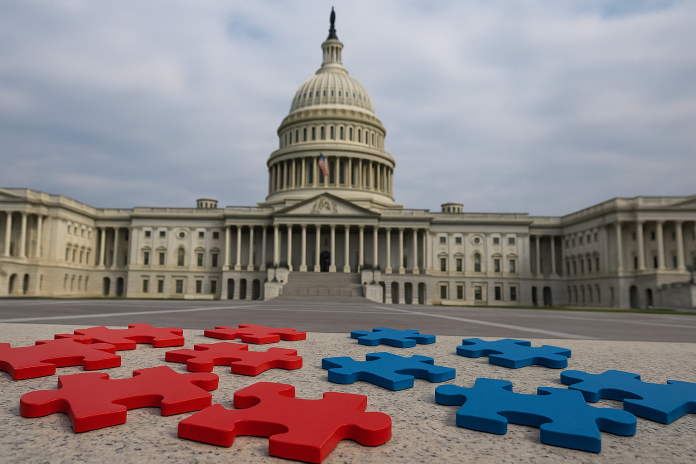What Is Political Gridlock?
Political gridlock occurs when:
-
Different political parties control Congress and the presidency
-
Lawmakers are unable or unwilling to compromise
-
Key legislation stalls for long periods
As a result, the government struggles to:
-
Pass budgets
-
Approve spending bills
-
Raise the debt ceiling
-
Implement economic reforms
Why Political Gridlock Is Increasing in the U.S.
Several trends have made gridlock more common:
-
Deep political polarization
-
Narrow congressional majorities
-
Strong ideological divisions
-
Increased use of filibusters and procedural blocks
While gridlock is not new, its frequency and intensity have increased in recent decades.
Impact on Government Spending and Shutdowns
One of the most direct consequences of gridlock is the risk of government shutdowns.
Economic effects of shutdowns include:
-
Furloughs for federal workers
-
Delays in government services
-
Reduced consumer spending
-
Lost productivity
Even short shutdowns can cost the U.S. economy billions of dollars.
Political Gridlock and Financial Markets
Markets dislike uncertainty.
When gridlock intensifies:
-
Stock markets may become volatile
-
Bond yields can fluctuate
-
Investor confidence weakens
Disagreements over budgets, debt limits, or major legislation can trigger short-term market drops and long-term risk premiums.
Effects on Business Investment
Businesses rely on predictable policy environments.
Political gridlock can:
-
Delay infrastructure spending
-
Postpone tax policy decisions
-
Create uncertainty around regulations
As a result, companies often:
-
Delay hiring
-
Reduce capital investment
-
Hold excess cash instead of expanding
This slows overall economic growth.
Consumer Confidence and Spending
Economic confidence is heavily influenced by political stability.
During periods of gridlock:
-
Households may reduce major purchases
-
Consumers increase precautionary savings
-
Spending growth slows
Lower consumer spending directly weakens GDP growth, as consumption makes up most of the U.S. economy.
Debt Ceiling Standoffs and Credit Risk
One of the most dangerous forms of gridlock involves the U.S. debt ceiling.
Potential consequences include:
-
Risk of delayed government payments
-
Credit rating downgrades
-
Higher borrowing costs for the government
Even without default, debt ceiling crises can damage global confidence in U.S. financial leadership.
Long-Term Economic Reforms Get Stuck
Gridlock also prevents long-term reforms in areas like:
-
Infrastructure
-
Healthcare
-
Immigration
-
Education
-
Climate investment
Without reform, productivity gains slow and the economy becomes less competitive over time.
Can Political Gridlock Ever Be Good for the Economy?
Some argue gridlock can have limited benefits:
-
Prevents abrupt or extreme policy changes
-
Creates regulatory stability
-
Protects markets from sudden shifts
However, persistent gridlock is generally harmful, especially when it blocks basic government functions.
Impact on Global Confidence in the U.S.
The U.S. economy does not operate in isolation.
Global investors watch Washington closely. Frequent gridlock can:
-
Reduce confidence in U.S. leadership
-
Strengthen competing global economies
-
Weaken the dollar’s stability during crises
Political dysfunction can ripple far beyond U.S. borders.
Who Is Most Affected by Gridlock?
Political gridlock disproportionately affects:
-
Federal workers
-
Small businesses reliant on government contracts
-
Low-income households
-
Investors seeking stability
Economic uncertainty tends to hit vulnerable groups hardest.
How the Economy Usually Recovers From Gridlock
Historically, the U.S. economy often rebounds once:
-
Temporary agreements are reached
-
Budgets are passed
-
Markets regain clarity
However, repeated crises reduce long-term trust and resilience.
Conclusion: Why Political Gridlock Matters for the U.S. Economy
Political gridlock is more than a political issue it is an economic risk factor. From government shutdowns and financial market volatility to weaker business investment and lower consumer confidence, gridlock can slow growth and damage economic stability.
While compromise is difficult in a divided political environment, effective governance remains critical to keeping the U.S. economy strong, competitive, and resilient.
For Americans, political gridlock isn’t happening “in Washington only” its effects are felt in jobs, prices, markets, and everyday life.



